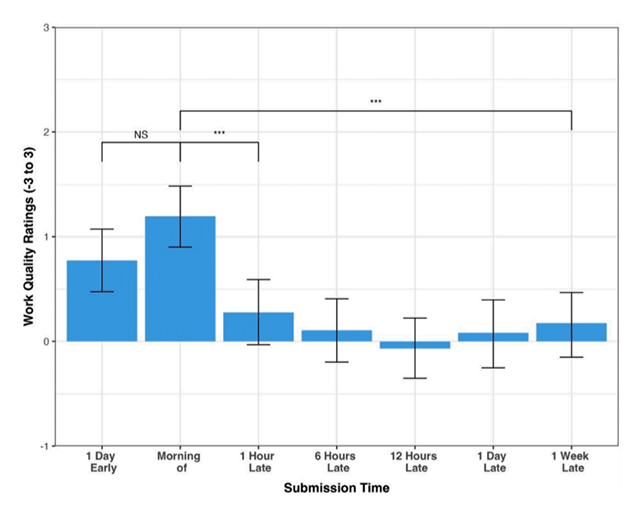Products You May Like
There’s value in hitting your deadlines, a new study shows: work submitted late is often thought to be of lower quality, even if it’s on a par with work finished on time, and the perception of the worker becomes more negative too.
Late submissions will get inferior rankings even if they only slightly miss the deadline, and the study also found that submitting work early doesn’t affect how it’s perceived. As long as you successfully hit the deadline, it doesn’t matter if you’re three weeks or three hours ahead.
“Everyone saw the exact same art contest entry, school submission, or business proposal, but they couldn’t help but use their knowledge of when it came in to guide their evaluation of how good it was,” says Sam Maglio, a social psychologist from the University of Toronto Scarborough in Canada.
A total of 18 different experiments were carried out by the team, involving 6,982 participants in total. Volunteers were asked to rate a variety of projects, while also being told whether they were submitted early, on time, or late.

How much of a detrimental effect the lateness of the submission had varied between the experiments, but Maglio and his co-author, behavioral marketing scientist David Fang from the Stanford Graduate School of Business, found it was often significant.
In one scenario using a -3 to +3 point scale, for example, the same work was given an average rating of 0.53 when it was labeled as submitted on time, and 0.07 when it was labeled as a day late.
There’s more bad news for those missing a deadline: giving a heads up in advance about the work being late doesn’t make much difference, and neither does having a stellar punctuality record in the past. You and your work will still be viewed more negatively.
The effects seemed to hold across ages and cultures too. In one test run by the researchers, schoolchildren in East Asia were asked to judge each other’s pieces of art, and late submissions got ranked lower – showing this happens for younger people in peer-to-peer relationships too.
However, there is one caveat. If you give an understandable reason why you missed the deadline, some of the damage can be repaired – though the excuse about the dog eating your papers probably isn’t going to cut it.
The researchers point out that lack of clarity about when work is due may impact an employee’s chances of making a positive impression.
“Communication around deadlines is vital,” says Maglio. “If it’s a hard and not a soft deadline, you as the manager should let your employees know.”
“If the reason why you missed the deadline was beyond your control, you as the employee should let your manager know. That seems to be one of the few instances in which people cut you a break.”
The research has been published in Organizational Behavior and Human Decision Processes.
